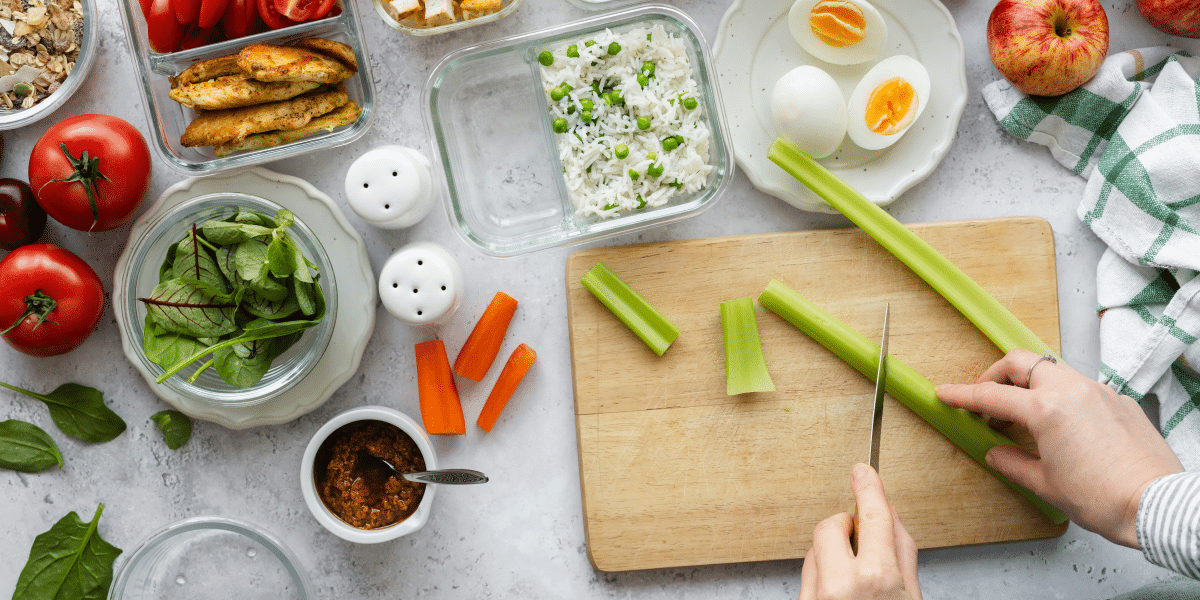Meal prepping is an organized approach that provides numerous benefits for those with hectic lifestyles, such as better budget management and healthier eating habits. By investing a few hours to cook meals in advance, individuals can significantly cut down daily cooking time, which can be used for other activities or relaxation. Prepping helps reduce food expenses through bulk purchases and minimize waste. More importantly, as described by Terry Monteith, it encourages a healthier diet by decreasing the likelihood of choosing fast food or processed foods.
Meal Prepping Advantages
Meal prepping is not just a fad; it’s a system that benefits anyone with a busy schedule. By dedicating a few hours to preparing meals for the week, you can save considerable time each day. This time can be redirected toward work, spending time with family, or simply relaxing. Furthermore, meal prepping often leads to cost savings, as buying ingredients in bulk and reducing food waste both contribute to lower overall expenses.
In addition to the practical benefits, meal prepping also supports healthier dietary habits. When meals are planned and prepared in advance, the temptation to opt for less healthy, last-minute dining diminishes. This ensures that nutritious meals, tailored to specific dietary needs and preferences, are always accessible, making it easier to maintain a balanced diet. Many people discover that meal prepping transforms their relationship with food. Cooking at home can increase awareness of nutritional content and enable a deeper appreciation for the ingredients used.
Prep Essentials and Planning
Undertaking meal prepping starts with the right tools. A well-equipped kitchen should have durable knives, cutting boards, and a variety of pots and pans. Equally important are the containers you choose; opting for high-quality, microwave-safe, and freezer-friendly containers can simplify the meal prep process significantly. This setup not only speeds up the preparation but also ensures that food safety and quality are maintained from the fridge to the table.
Setting achievable goals is crucial when planning meals for the week. It’s imperative to assess your schedule and determine how many meals you need to prepare in advance. This planning phase should also involve a balanced menu that includes proteins, vegetables, and carbohydrates, ensuring that each meal is satisfying and nutritious. By maintaining a pantry stocked with staples such as grains and spices, you can quickly adapt recipes and reduce trips to the grocery store.
Efficient Cooking Techniques
Mastering batch cooking is a game-changer for meal prep. This involves cooking large quantities of food at once, which can then be divided into individual portions and stored for later use. By cooking multiple meals together, you minimize the time spent in the kitchen and make cleanup easier. Techniques such as roasting multiple vegetables simultaneously or simmering a big pot of chili can be particularly time-efficient.
Another tip for speeding up meal preparation is to become proficient in cutting techniques. Learning how to quickly and safely chop vegetables or slice meats can drastically reduce prep time. Additionally, mastering the art of seasoning can elevate dishes without requiring elaborate ingredients. A few well-chosen spices or a dash of fresh herbs can transform a simple meal into a culinary delight, keeping your taste buds satisfied and the meals enjoyable.
Storage and Meal Management
Practical storage solutions are vital to prolonging the freshness and flavor of prepped meals. Using airtight containers can prevent moisture and air from spoiling the food, which is crucial for maintaining taste and nutritional value. Refrigerating or freezing meals in portion-sized containers (I opt for glass) also helps in managing meal sizes and reduces the temptation to overeat. Moreover, labeling containers with dates and contents avoids confusion and helps in using older meals first.
Weeknight Meal Prepping
A typical week might include a variety of meals that cater to different tastes and dietary requirements. Consider a Monday dinner of grilled chicken breast, steamed broccoli, and quinoa. Midweek might feature a vegetable stir-fry that can be quickly heated and served, providing a nutritious meal without the fuss of extensive cooking. Towards the end of the week, a hearty soup or omelet including leftover vegetables and proteins can ensure no food is wasted while offering a comforting and easy option.
Overcoming Obstacles with Tech Tools
Navigating the challenges of meal prep requires flexibility and the right tools. Unexpected events like a sudden change in plans or special dietary needs can disrupt even the best-laid meal plans. Having a flexible mindset and a backup plan, such as easy-to-assemble salads or wraps, can keep you on track without the stress. Additionally, technology can be a significant ally in meal planning. Apps that organize recipes, give you a place to store your favorites and create shopping lists streamline the planning process. Others track nutrition and help manage dietary restrictions, making it more straightforward to stay committed to health goals.
Published by: Khy Talara









